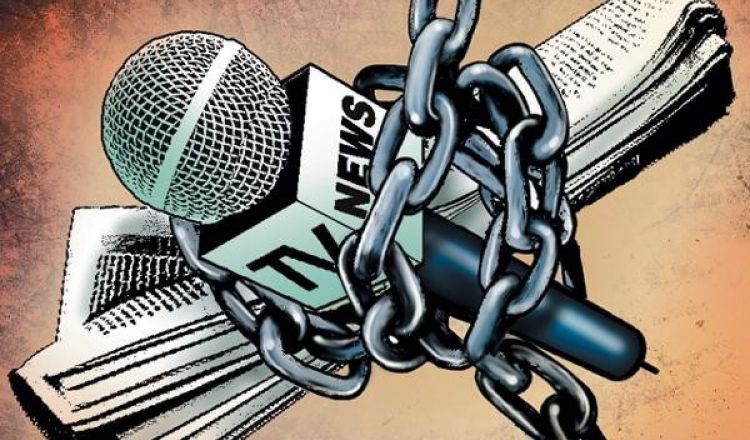How Strategic Lawsuits Are Used to Silence Journalism
2022-01-06 06:13

How Strategic Lawsuits Are Used to Silence Journalism-voanews
Lengthy and expensive lawsuits aimed at draining a journalist’s time and resources are a threat to investigative journalism, media analysts say.
The impact of legal action known as Strategic Lawsuits Against Public Participation, or SLAPPs, was the focus of a conference this week.
Most SLAPPs are filed as defamation lawsuits, often targeting journalists who cover financial crime or corruption. And while they often don’t hold up in court, the suits come with disproportionately high demands for damages in an effort to have a journalist retract or remove a story.
Or as Matthew Caruana Galizia told the conference Tuesday, “The objective is not to show that the journalist was wrong, it is simply to shut them up.”
His mother, the investigative journalist Daphne Caruana Galizia, was fighting more than 40 lawsuits when she was killed in Malta in 2017. Several remain ongoing, Galizia told the conference.
The cost of such lawsuits is not lost on Clare Rewcastle Brown, the founder and editor-in-chief of news website Sarawak Report.
Rewcastle Brown was served with a defamation case over reporting in 2015 that alleged ties between then-Malaysian Prime Minister Najib Razak’s personal bank accounts and the 1Malaysia Development Berhad, or 1MDB, state fund.
Najib was later sentenced to 12 years in prison on corruption and money laundering charges.
The suit against Rewcastle Brown was settled in early 2019, but the journalist says defending herself came at a huge cost, including cashing in her pension.
“Your best defense against these people is having nothing they can take,” Rewcastle Brown told VOA. “Any journalist who covers a big story involving wealthy people, the first thing that you have to accept is that you are going to get deluged with massively aggressive legal pushback.”
Her case was among those discussed at the anti-SLAPP conference, which was held in London and online and was hosted by the Justice for Journalists Foundation and the Foreign Policy Centre.
“This is a real threat to media freedom,” Susan Coughtrie, project director at the Foreign Policy Centre, told VOA. “Journalists are being intimidated and faced with really expensive legal action, which in the U.K. can be incredibly expensive compared to other jurisdictions, and very lengthy and very burdensome.”
Rights groups have previously criticized Britain’s laws, which they say allow for “libel tourism,” where a lawsuit is filed in a country separate from where the alleged offense took place.
Legal threats
When the Foreign Policy Centre, the Organized Crime and Corruption Reporting Project (OCCRP), and other media groups questioned investigative journalists about risks in their work, 73% of respondents said they had been threatened with legal action.
The study, published in late 2020, surveyed 63 journalists in 41 countries.
Paul Radu, co-founder of the OCCRP, was sued for defamation after publishing the "Azerbaijani Laundromat” series in September 2017, which alleged money laundering among members of the Azeri parliament. Radu was also one of the panelists at the conference.
“It is crucial for investigative reporting and especially for cross-border investigative reporting to be able to do your work in a proper manner, without the threat of a frivolous court case looming over,” Radu told VOA.
The defamation case filed against him in Britain lasted two years and was settled days before Radu was scheduled to appear in court. The process was time-consuming, expensive and invasive, the journalist said.
As part of the discovery phase of the lawsuit, Radu’s laptop, phone and hard drives were copied and scanned for key words — a process that cost him tens of thousands of dollars.
“The bill can be huge,” Radu told VOA, “and this is what the people behind SLAPPs count on. They count on you and your resources drying up.”
Radu credits the OCCRP for providing the means to counter such lawsuits, including access to lawyers who often work pro bono, insurance, supportive colleagues and mental health counseling.
But these support systems are often not available to independent and freelance journalists. Because of that, the risk of legal action can limit reporting.
“Outside of organizations like OCCRP, there is a lot of self-censorship,” Radu told VOA. “There are mainstream media in many countries that just don't do investigative reporting because of the fear of SLAPPs.”
'Democratic impacts'
Charlie Holt, legal adviser at Greenpeace and the U.K. campaigns adviser for English PEN, said the prevalence of SLAPPs has serious ramifications.
“It’s obviously a pressing problem for individuals, it’s obviously a pressing problem for press freedom, but there are democratic impacts as well, linked to the way that SLAPPs impede accountability,” Holt told VOA. “Wherever you have a high-profile scandal which is exposed, you’ll find it’s almost always preceded by a pattern of lawsuits and legal threats.”
Holt was among the panelists to speak at the conference this week.
Coughtrie, of the Foreign Policy Centre, said the prevalence of SLAPPs is an “open secret” in the industry that often doesn’t get spoken about publicly.
“The current system is being misused by some people and there is an opening for it to be misused because of the cost and because the process can get dragged out,” Coughtrie told VOA. “It’s very intimidatory.”
She said legislative and regulatory reform is needed to make the process more equitable for all parties.
Rewcastle Brown, who has seen the personal and professional impact of such lawsuits, emphasized the impact that SLAPPs have on the news industry.
"It’s chilling journalism, it’s chilling freedom of expression, and it’s taking from the public this terribly important service that journalists provide,” Rewcastle Brown said. “It’s undermining democracy, and the process is very effectively putting immense power in the hands of people who are already immensely powerful by virtue of their wealth and influence.”









